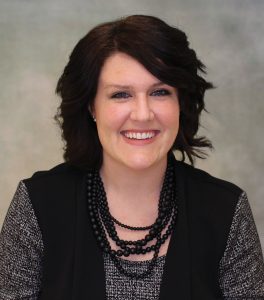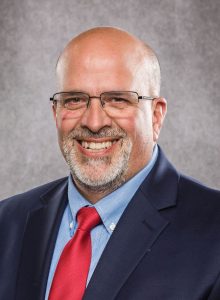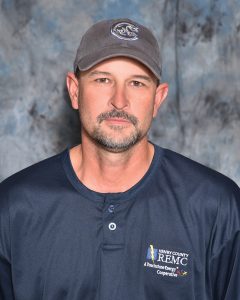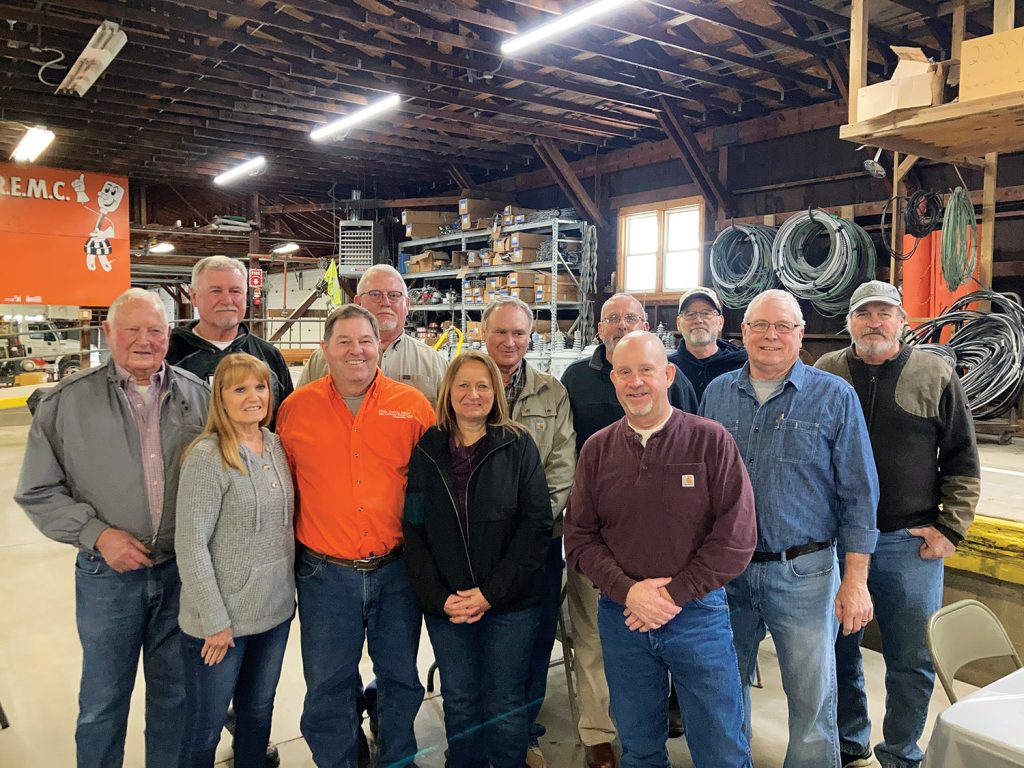
By Richard G. Biever

Jaime Walker came out of college 14 years ago wanting to be a crusader for good. “I know that sounds a little cheesy,” she admits, “but I feel as if I was put on this earth to help people.”
While she wore no superhero cape, she ducked inside her local REMC where she transformed her degree as a mild-mannered journalist, communications, and culture graduate into a dynamic career that’s stayed true to her altruistic goals. “It’s not what we do at the REMC, it’s how we do it and why we do it. We have passion behind the purpose — and that is to improve the lives of our membership.”
Now the vice president of member services at Northeastern REMC in Columbia City, she adds, “We can leave a legacy here. It’s not just a job. It’s more of a calling.”

Tim Landrigan figures joining an electric cooperative when he did a couple years out of high school gave him a 20-year head start on his career. At just 30 years old, Landrigan is settling in as the chief financial officer at Warsaw-based Kosciusko REMC, a position he was promoted to in 2021.
“It’s very surprising,” he says of his meteoric rise that included earning his accounting degrees at night while working for the co-op by day. “I thought I’d be in this spot 30 years from when I started. I didn’t think I’d be doing it when I was 30.”

You won’t find “Fuzzy” listed as such on the résumé of RushShelby Energy’s Chris Chastain. But for three summers, his first experiences with an electric co-op were as a college intern — with the epithetical dubbing courtesy of the grizzled older outdoor crews. “I suppose that probably derived from the peach fuzz still on our faces,” Chastain guesses.
Nickname aside, what the Rose-Hulman electrical engineering student saw at his hometown electric co-op back in the summers of 1994, ’95 and ’96 impressed him so much that he knew that was what he wanted for his career. Chastain not only built a career with electric co-ops, as of last October, he’s now RushShelby Energy’s president and CEO. “Cooperatives are a special, special place. Sometimes, people take their jobs for granted. But once you can get inside a cooperative, you sense the well-defined purpose. That’s to serve our membership and to serve each other.”

The U.S. Bureau of Labor Statistics says the average worker today will hold 10 different jobs before the age of 40. Chad Hinesley was pretty much right in the average. He held 10 different jobs by age 44. But how many “average workers” hold 10 different jobs — without ever changing employers?
Not long after high school, in 1996, he hired on with Henry County REMC’s tree-trimming crew. And then, he started climbing every rung of the “cooperative ladder” … up through meter reader and groundman, apprentice lineman to journeyman/lineman and then to a line foreman. Now Hinesley, 46, is the line superintendent. “It’s been nice to be able to start at the bottom and have the opportunity to work your way up.”
These four co-op leaders had widely varying futures in mind coming out of high school. But they found a common storyline at their local consumer-owned electric utility. And their stories are told time and again by others throughout Indiana’s 38 electric cooperatives (REMCs/RECs) and allied cooperative organizations.
“Indiana’s electric cooperatives offer a multitude of jobs that can lead to fulfilling careers for young people wanting to stay in their local community,” said Ann Mears, youth and partnership development manager at Indiana Electric Cooperatives. “Reaching out to young career-seekers and letting them know about these opportunities is crucial. It’s crucial for co-ops looking to fill vacancies created by retirements as other employees move up and to fill new jobs created by expanding services. And, it’s crucial for the communities co-ops serve to retain their young people and attract others.”
Partly for their isolation in rural areas where good-paying, stable jobs aren’t as easy to come by and for their reputation as great places to “get on if you can,” electric cooperatives have always been noted for employee longevity and dedication. But as Baby Boomers retire and are replaced by younger generations who may not be as prone to stay for the long haul as predecessors, co-ops have been working harder to not only attract new employees but also retain, train or retrain and develop them.
October is National Cooperative Month. It’s when cooperative businesses, including not-for-profit electric co-ops, like to point out the “cooperative difference.”
That difference is exemplified in their adherence to the “Seven Cooperative Principles.” One of those is “education, training and information” for staff, directors and members. This principle manifests itself in the way co-ops work to develop their employees in their positions — and as people. It’s key to keeping the best employees and helping them grow into new positions. And it’s key to better serving the consumers.
Brett Abplanalp, CEO at Greensburg-based Decatur County REMC, said “employee development” is critical to all a co-op does. “If we don’t have a high performing workforce, then we’re not providing for our members.”
Abplanalp said employees are the co-op’s most important asset. Investing in their training and growth, and helping them “design” their career, inspires them and brings improved performance and increased engagement.
He said it also helps the co-op attract high performers who ask about training and growth when they apply. “I have a program that says, ‘Hey, we’re not going to just hire you and expect you to go to your job, we’re going to continuously invest in you.’”
“Every employee wants to be valued, respected and heard,” Abplanalp said. “If they know we care to invest in them, it helps them know they are.”
Cooperative careers 101: An introduction
Indiana’s electric cooperatives say 20% of their employees will either be eligible for retirement in the next five years or are eligible now. And, according to recent studies by the National Rural Electric Cooperative Association, it’s even higher for executives (general managers, CEOs and COOs) — 45.7%.
With the technology used for power delivery rapidly evolving, cooperatives will have to fill those positions with the best and brightest applicants. It is in the best interest of all electric cooperatives to work together to make sure the incoming workforce is aware of the wide variety of jobs available, the competitive wages and benefits, and the peace of mind cooperatives provide.
To that end, IEC’s Ann Mears helps open doors and windows — and young eyes — to electric cooperatives. Indianapolis-based Indiana Electric Cooperatives is the association that publishes Indiana Connection and provides safety training; regulatory compliance; educational and leadership training; government relations; communications, and finance and accounting support; and coordinates youth programs for the state’s electric cooperatives. IEC is a smorgasbord of career opportunities in itself.
Mears attends about 10 career fairs throughout Indiana each semester, some at colleges and universities or regional career events. She also assists local distribution cooperatives (REMCs/RECs) with career fairs in their home areas.
Ryan Stuthers is a prime example of co-ops working together to inspire and hire young talent.
Stuthers pursued an electrical engineering degree when he went to Anderson University, though he wasn’t sure what type of electrical engineer he wanted to be. “There are a lot of avenues you can take in that career field,” he said. “Anderson does a really good job of exposing you to all of them.”
Even so, one electric career avenue he had never even heard about was electric cooperatives. “I had no idea what an electric co-op was,” the Terre Haute native admitted. But passing through a career fair on campus his junior year, he ran into Mears at IEC’s careers booth.
That day, Mears introduced Stuthers to Indiana’s electric co-ops. “I thought it was fascinating,” he said. “It was a neat concept, and I couldn’t believe I didn’t know anything about it.”
The brief conversation Mears had with Stuthers led to follow-up emails and phone calls. Those led to a job shadowing opportunity at WIN Energy REMC in Vincennes.
“We needed to get him connected somewhere,” Mears said.
So, she reached out to WIN Energy, Stuthers’ most local “home” cooperative that serves territory around Terre Haute and south all the way to New Harmony.
Once Stuthers visited WIN Energy and shadowed its director of engineering, the “ah-ha” moment came for him.
“He gave me an overview of not just co-op specific things but all of the concepts that fall within the realm of distribution engineering, all of the technologies and their history, and how it’s advancing,” he said. “What piqued my interest the most was making connections from theory — the vast array of electrical engineering concepts from a bunch of different college classes — to real-world application.”
And, Stuthers noted, it was his chance to see jobs existed in which he could apply the many different concepts he had studied. He didn’t have to just focus on one aspect of engineering. “I think that’s what really sold me.”
“It was a good experience,” said Leslie Beard, WIN Energy’s chief operating officer. “Ryan learned a lot about the industry.”
She added that bringing in young people for job shadowing and internships is a win for the co-op, too. “There’s a lot of value for the cooperative because the students bring different ideas and new thoughts. There’s value in showing them there are professional jobs — whether it’s engineering or marketing or accounting, or whatever — right in their community.”
Though WIN Energy had no openings at the time, Stuthers stayed connected to Indiana’s electric co-op network. A month after graduation in May 2020, he was hired as an engineer for Tipmont REMC’s electric distribution system in and around Lafayette.
The position allows him to pursue his interests in the broad array of electrical engineering concepts. The position also gives him responsibility over engineering and advancing technology, which is unique among his Anderson classmates who took other paths, he noted.
One thing is for sure, he said: “If Indiana Electric Cooperatives hadn’t been at that career fair, there’s no way I would have ended up here at Tipmont.”
Offer it, and they’ll come
In the past few years, Kankakee Valley REMC hosted its first two summer interns and was working on a third until the pandemic hit.
“We’ve always felt people don’t know what careers are actually available at a co-op,” said Amanda Steeb, Kankakee Valley’s director of marketing and communications. “You think of electricity, and you immediately just think of linemen. You don’t really think about all the other professions that make up the co-op. This was a great way to introduce ourselves to our youth.”
Steeb noted Kankakee Valley typically doesn’t have a hard time filling job openings. “That being said, we also know we’re facing a lot of retirements. Getting these interns in, having them get excited about the co-op, having them see the benefits of coming back to this community and working for a co-op,” she said, “may bring some of these interns back. That is the end goal, and I think we’re on the right path to do that.”
Kankakee Valley also reaches out to the young adults with its Operation Round Up scholarships. For a student to get the full scholarship, she noted the student must participate in several activities with the cooperative. Activities could include job shadowing or attending an annual meeting or a community event like the 4-H fair where they’d greet fair-goers alongside cooperative employees at the REMC booth.
“The youth out there are hungry for this type of knowledge and understanding of what goes on in a business environment,” Steeb said. “We just have to create those opportunities, and they’ll come.”
Changing times

A picture Chadd Jenkins carries paints not just words but spins yarns of years — 350 years all told. It tells the tale of the huge changes and challenges coming to an electric cooperative near you. And it highlights the roles and careers talented young people entering the workforce can eventually fill in their hometowns.
At first glance, the photo appears to be a nondescript “group shot.” Twelve people are gathered in the warehouse at Parke County REMC. But on closer look — the laugh lines on the smiling faces, the more-salt-than-pepper hair and beards, the receding hairlines and rounding waistlines — all indicate the posed but relaxed nine men and two women appear to be Baby Boomers.
Those 12 REMC employees have all retired within the past half dozen years. And with them, says Jenkins, the REMC’s CEO, a whopping 350 years of co-op experience and knowledge left the building. He notes Parke County today has 35 employees — with the cumulative experience of 380 years. To put it in Boomer vernacular, “The times, they are a-changin’.”
“That picture says it all — why employee development is critical,” Jenkins says. “Retirements are going to happen. We can either do nothing and just let them happen. Or we can focus on the areas we know we are going to be needing to fill, and work on them ahead of time.”
“For young adults searching for a line of work to build a meaningful career in rural and suburban Indiana,” Mears says, “now is the time to consider your local cooperative.”
RICHARD G. BIEVER is senior editor of Indiana Connection.



